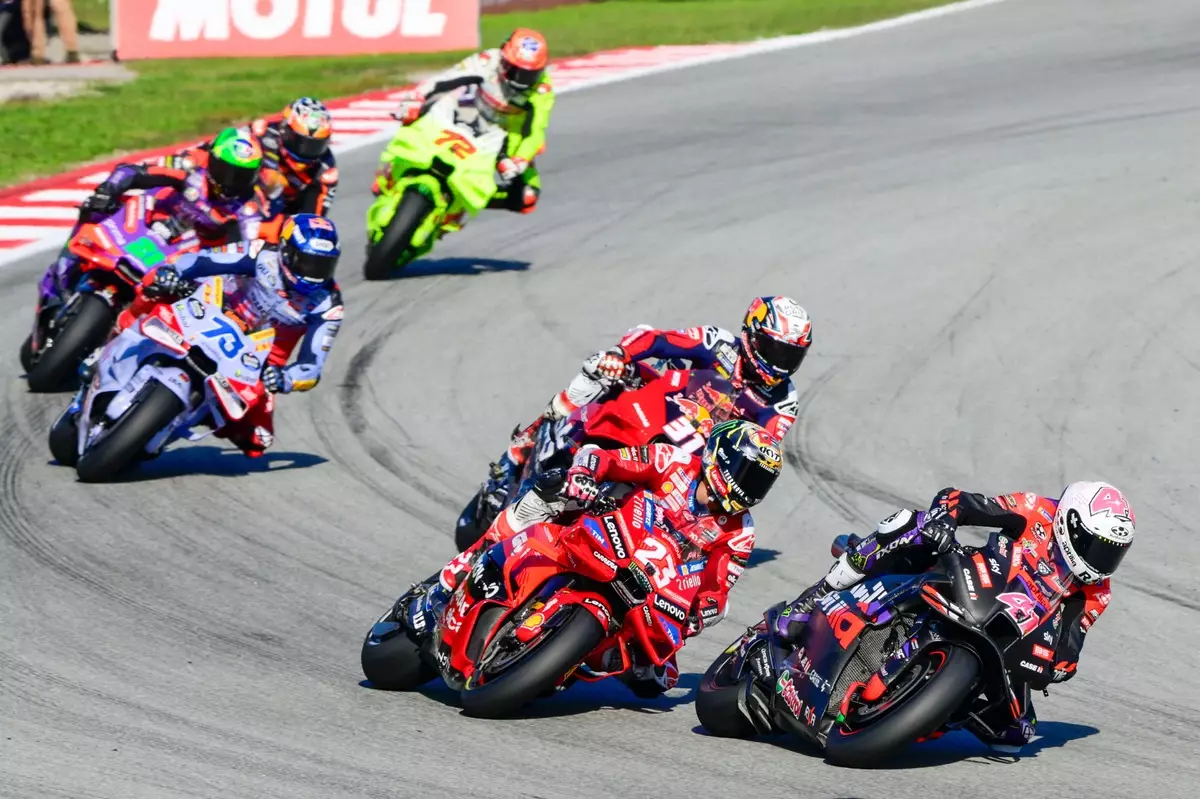The Barcelona Grand Prix was not just a race; it unfolded into a dramatic clash of personalities and competitive spirits that highlighted the tension inherent in MotoGP. Ducati rider Enea Bastianini publicly expressed his frustrations with Aprilia’s Aleix Espargaro after the race, suggesting that Espargaro’s actions were less than honorable. This incident reveals the complexities of motorcycle racing, where camaraderie can sometimes dissolve into rivalry, especially when championship glory hangs in the balance.
The stakes were exceptionally high at the Barcelona Grand Prix. Enea Bastianini was engaged in a tight battle for third place in the overall championship standings against Marc Marquez, while Aleix Espargaro found himself in a supportive role for his compatriot, Jorge Martin, who was fiercely contesting the title against Francesco Bagnaia. Espargaro, starting from second on the grid and finishing fourth, appeared to prioritize Martin’s title bid over competing aggressively against him. This aspect of the race was not just a tactical choice; it bore the weight of personal relationships and the camaraderie among Spanish riders.
Bastianini’s struggle against Espargaro’s defensive maneuvers persisted for much of the race, complicating his attempt to secure a strong finish. He pointed out that Espargaro’s focus on aiding Martin deprived him of the chance to accrue vital championship points. The resulting frustration culminated in a visibly unhappy Bastianini, who felt that Espargaro’s tactics were unprofessional and contrary to the spirit of the competition.
A Battle Lost: Bastianini’s Perspective
Bastianini finished the race in seventh place after hitting a snag early on. His inability to capitalize on his grid position was accelerated by a costly mistake at Turn 1, leading him to take the escape road. This incident hindered his momentum and ultimately cost him valuable points in the championship race. His insistence that Espargaro’s defensive riding was detrimental to his race, coupled with his reflection on Espargaro’s final grand prix as a full-time racer, indicates a deeper layer of dissatisfaction.
Bastianini articulated his disappointment candidly: “Without the fight with Aleix, I could have likely done more for myself.” His comments are indicative of a growing concern within the MotoGP community regarding the loyalty riders owe each other versus their own competitive aspirations. The fine line between friendship and competition can quickly turn fraught, especially when championship points are on the line.
In stark contrast to Bastianini’s perspective, Espargaro defended his actions by highlighting the competitive nature of the sport. He described his great friendship with Jorge Martin as a motivating factor. In Espargaro’s view, he was not simply riding to impede Bastianini; rather, he was riding at the limits of his ability in his quest to assist a friend. Espargaro’s assertion that he was fully focused on his final grand prix performance runs counter to Bastianini’s claims and places the spotlight on the varying interpretations of racing ethics.
Espargaro’s post-race comments reflect a belief that loyalty to a friend in the sport should take precedence. He mentioned, “It was my last race, and I was motivated to protect my little brother.” This loyalty raises questions about whether such alliances compromise the integrity of competitive racing, and whether riders should prioritize personal relationships over individual accolades.
The Fallout: Implications for the Future
The Barcelona Grand Prix was more than just a race; it served as a microcosm for broader themes within the sport. The clash between Bastianini and Espargaro crystallizes the tension that exists when friendship meets fierce competition. As Bastianini missed out on crucial points and watched Espargaro finish ahead with a purpose that detracted from his own objectives, it invites reflection on the nature of rivalries in MotoGP.
Looking to the future, both riders face pivotal moments in their careers. As Martin prepares to join Aprilia as the reigning world champion, the dynamic within the team will shift, possibly transforming the existing friendships into even more intense rivalries. The events of the Barcelona Grand Prix remind fans, analysts, and participants alike that the lines between support and competition are often blurred in the high-stakes world of MotoGP.
As this rivalry continues to unfold, it raises a significant question: How will these interpersonal conflicts impact future races and the evolving competitive landscape in motorcycle racing? The consequences of the Bastianini-Espargaro incident are sure to ripple across the paddock, as championship aspirations and personal loyalties intertwine in unpredictable ways.

